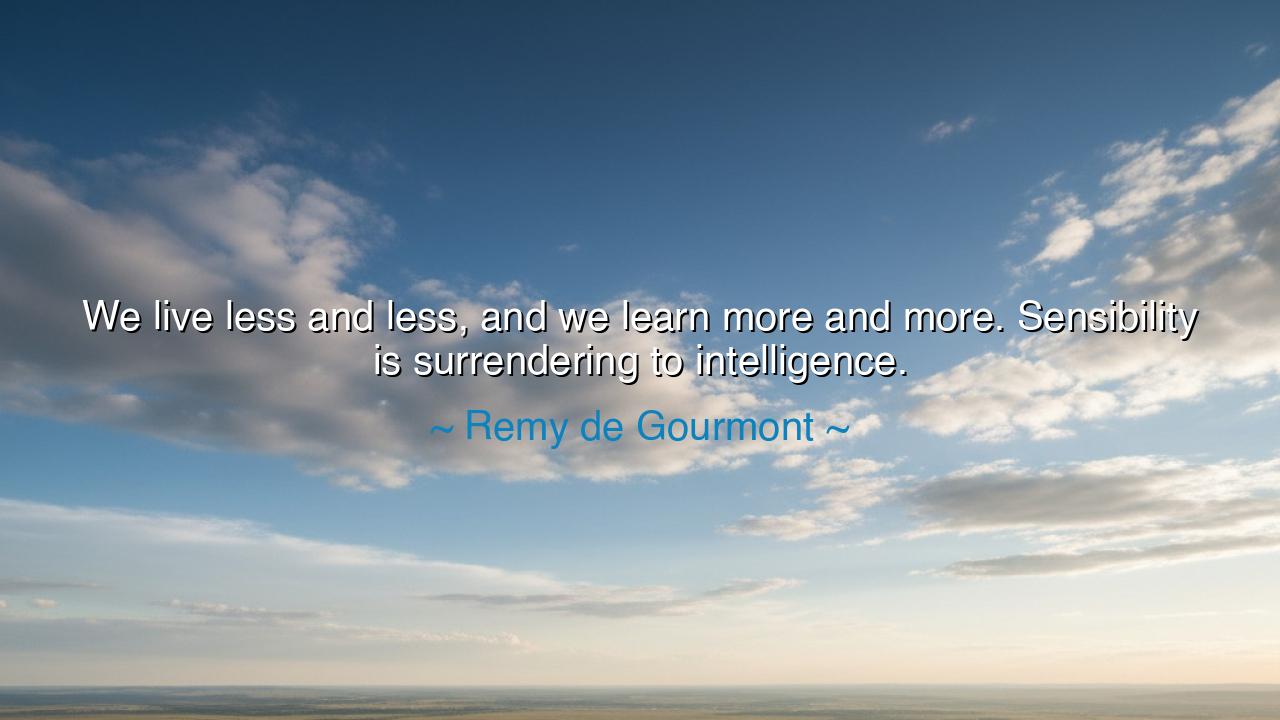
We live less and less, and we learn more and more. Sensibility is
We live less and less, and we learn more and more. Sensibility is surrendering to intelligence.






In the solemn words of Rémy de Gourmont — “We live less and less, and we learn more and more. Sensibility is surrendering to intelligence.” — lies a lament for the fading warmth of the human heart. These words, born in the late 19th century amid the rise of mechanized reason, speak to a world that was beginning to worship the mind above the soul. Gourmont saw, even in his own time, that humankind was trading the raw music of life for the cold precision of knowledge. We had begun to measure the world, to dissect it, to classify it — yet in doing so, we had forgotten to feel it. His quote stands as both prophecy and warning: that the more we fill ourselves with facts, the more we risk emptying ourselves of wonder.
To live, truly live, is not merely to exist, nor to accumulate learning as coins in a scholar’s purse. To live is to feel the pulse of existence within every moment — to be moved by beauty, to weep at sorrow, to tremble at love, to taste the mystery that cannot be written in any book. Yet in our pursuit of intelligence, we have trained ourselves to suppress such trembling. We praise reason and silence the heart. We prize explanation and lose reverence. Thus, says Gourmont, sensibility — that delicate faculty of feeling, of intuition, of quiet sympathy with life — has surrendered to the empire of logic.
In ancient days, the wise sought balance between mind and soul. The philosophers of Greece did not only think — they sang, they gazed at the stars, they wondered at beauty. Plato wrote not only of forms and truths, but of the soul’s longing for the eternal. But in our age, the pendulum has swung too far. We know the anatomy of the rose, but we have forgotten its fragrance. We can calculate the distance to the stars, yet we no longer kneel in awe beneath their light. The intellect, once a servant of the heart, has claimed the throne.
Consider the life of Vincent van Gogh, a man of unbearable sensibility. In an age of growing rationalism, he lived and painted not with intellect, but with fire. Every stroke of his brush was a prayer, every color a cry. The learned mocked him, called him mad. Yet his art pierced deeper than the words of his critics, for it spoke in the language of the soul. He lived more than he learned, and though it cost him his peace, he bequeathed to humanity something far more precious than intellect — truth through feeling. Van Gogh’s torment reveals what Gourmont feared: that in silencing sensibility, society loses its poets, its dreamers, its prophets — the very souls who remind us what it means to be human.
We must understand that knowledge without emotion is sterile. It is a lamp without oil. The modern world, overflowing with information, suffers from a famine of meaning. We have learned to explain thunder, yet we no longer hear the voice of the heavens in its roar. We have charted the oceans, yet we have forgotten how to feel awe before their vastness. Gourmont’s lament is not an attack on intelligence, but a plea for harmony — that the heart and mind may once again walk side by side.
Therefore, let this teaching be written upon your soul: do not let your learning make you less alive. Study, yes — but also weep, love, wander, and marvel. Let your intelligence be tempered by compassion, and your sensibility strengthened by understanding. Do not measure every joy by its usefulness, nor every sorrow by its logic. Feel deeply, for to feel is to live. The ancients knew that wisdom was born not from thought alone, but from the union of thought and feeling — logos joined with pathos, reason married to love.
And so, my child, in this age of bright screens and restless intellects, dare to be one who still feels. Listen to music not for its structure, but for its soul. Look upon the world not as a problem to solve, but as a mystery to behold. Read not only to learn, but to awaken. For when sensibility and intelligence dwell together in peace, when the mind serves the heart instead of enslaving it — then, and only then, shall we live fully once more. For the purpose of wisdom is not to extinguish life, but to make it radiant.






AAdministratorAdministrator
Welcome, honored guests. Please leave a comment, we will respond soon